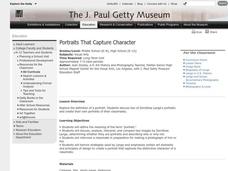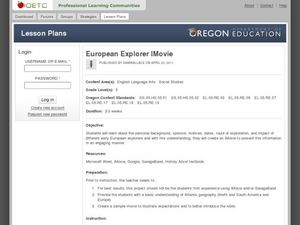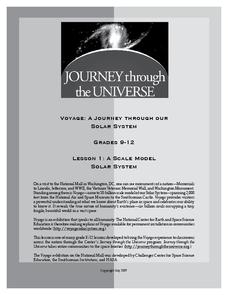LABScI
Kinematics: The Gravity Lab
Falling objects can be brutal if you don't protect your noodle! Scholars explore the motion of falling objects through measuring short intervals to determine if the distance traveled varies with time. Building off of this, scholars...
NASA
What's the Frequency, Roy G. Biv?
While all light travels at the same speed, each color in the visible light spectrum contains a different wavelength and frequency. Scholars determine the relationship between frequency and wavelength as they complete the activity. They...
Science Matters
Mighty Microorganisms
How can you tell if a microorganism is helpful or detrimental to an ecosystem? Learners inspect slides or pictures of microorganisms and record their observations to...
J. Paul Getty Trust
Portraits That Capture Character
One of the great things about technology is that it lets youngsters visit museums that may be many miles away. With this resource, middle and high schoolers can visit the portrait galleries at J. Paul Getty Museum, located in Los...
Curated OER
Taking the Boat to Manaus
Fifth graders apply the concepts they know regarding mass, volume and density in the previous activities to design a boat. Student teams must make a boat which can travel the waters of the Amazon Rainforest. Each group makes a...
Curated OER
Walk in My Shoes: A Shoe's Perspective
Help learners write a creative story from the viewpoint of a shoe. The teacher brings a variety of different types of shoes to the classroom and each person chooses one. They then write a story from the point of view of the shoe,...
Curated OER
Shoes and the Backyard Landscape
Your shoes get a lot of mileage in familiar places. Represent the places you have traveled the most with an art project based on a print of Indian People Wear Shoes and Socks by Juane Quick-to-See Smith. Kids trace their shoes and...
Curated OER
European Explorer IMovie
Film is a wonderful way to communicate any concept or idea. Fifth graders will use IMovie and GarageBand software to create a IMovie about one of eight European explorers. They will chose an explorer, research his travels and life, then...
Curated OER
The Physics of Flight
Three activities allow young flight engineers to understand the 4 principles of flight (weight, lift, thrust, and drag), to construct a glider, and to create a propeller. Multicultural history and literature are integrated by reading...
EngageNY
Writing a First Draft: Accessing Books Around the World Informative Paragraph
Supervise the final drafting of a well-organized paragraph by following the steps outlined in this plan. Using the included sample paragraph as a model, class members brainstorm criteria for quality work and then compose their paragraphs...
EngageNY
Revising My Accessing Books Around the World Informative Paragraph for a Hook to Captivate My Reader
While this is considered optional within the unit it is designed for, pupils would benefit from the listed activities. Working on writing and revising a paragraph about librarians who travel to isolated areas, class members can add some...
University of Wisconsin
Designing a Rain Garden
Now it's time for all of the data collected in previous lessons to be applied to the design of a rain garden. This resource can only be used as part of the greater whole, since learners will need to rely on gathered knowledge in order to...
Centers for Disease Control and Prevention
Understanding the Epidemiologic Triangle through Infectious Disease
Introduce infectious diseases and the epidemiologic triangle. A helpful resource describes the agent, host, and environment from the three vertices as well as the time factor, which is in the middle. Scholars complete a simple...
Polar Trec
Where in the World Is Our Teacher?
Kirk Beckendorf, a middle school teacher, joined researchers at the McMurdo Station in Antarctica to help maintain automatic weather stations. The lesson plan encourages pupils to track his travels around the region. They connect with...
Prince William Network
Migration Headache
During this game, kids become migratory shorebirds and fly among wintering, nesting, and stopover habitats. If they do not arrive at a suitable habitat on time, they do not survive. Catastrophic events are periodically introduced that...
Journey Through the Universe
A Scale Model Solar System
Between the time scientists discovered Pluto and reclassified it as a dwarf planet, it did not even make one full revolution around the sun. In two activities, scholars investigate scale models and their properties. Pupils find that it...
NASA
Photons in the Radiative Zone: Which Way Is Out? An A-Maz-ing Model
Can you move like a photon? Young scholars use a maze to reproduce the straight line motion of a photon. The second in a six-part series of lessons on the sun has learners measure angle of incidence and refraction to determine the path...
Curated OER
Not Your Average Average
Students discover that if a distance is traveled in two or more segments at different average speeds, you cannot average the average speeds. Instead the total distance traveled must be divided by the total elapsed time. Students practice...
Curated OER
How Far And How Long Will It Take
Students use a ruler to determine length and then fit the unit to a scale in miles. This unit will also give a geological awareness of altitude and the difference it makes in travel time. The travel time with Mapquest will obviously be...
Curated OER
Just How Big is this Place?
Students are introduced to the the formula for calculating travel time. They listen to different scenarios relating to long distance travel into space and calculate travel time using the formula.
Curated OER
Exploring and Comparing Other Communities
Third graders search TDC database for images of physical geography maps, weather maps, natural resources maps, and old travel brochures. They create a new travel brochure of an area of their choice using the information they gathered.
Curated OER
Domino Dash
Eighth graders examine the relationship between speed, time and distance. In this motion lesson students complete a lab activity that allows them to calculate average speed.
Curated OER
Mars Calendar Project
Students design a calendar that displays time on Mars. They explore the differences between time on Earth and time on Mars while making the calendar.
Curated OER
Missed The Boat
Learners complete time and distance problems. Using appropriate problem solving strategies, students determine when a helicopter will catch a cruise ship. Learners write a summary of their solution process. They complete a graph to...
Other popular searches
- School Projects Time Travel
- Time Travel Journal Rubric
- Time Travel Unit Theme
- Time Travel Genre
- Creative Writing Time Travel
- Time Travel Relativity
- Time Travel Short Story
- Time Travel Third Grade
- Time Travel Physics
- Time Travel Webquest
- Estimation Time Travel
- Drama Time Travel























